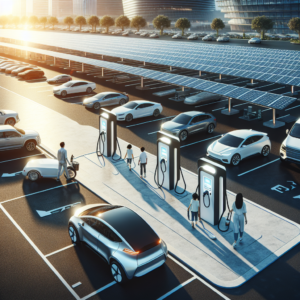Unveiling the Future: The Shocking Rise of Electric Vehicle Mandates
[caption id="attachment_32014" align="alignnone" width="695"] Car Parking Lot - New Electric Vehicle[/caption]
As the world grapples with the pressing challenges of climate change and environmental degradation, electric vehicle (EV) mandates have emerged as a pivotal strategy for governments aiming to reduce greenhouse gas emissions and promote sustainable transportation. This article delves into the multifaceted landscape of electric vehicle mandates, exploring current policies, global implementations, economic implications, technological advancements, public perception, and future trends. The rise of these mandates signals a transformative shift in the automotive industry and broader societal attitudes toward energy consumption and environmental responsibility.
Understanding Electric Vehicle Mandates: A Comprehensive Overview of Current Policies
Electric vehicle mandates are regulatory measures implemented by governments to accelerate the adoption of electric vehicles and phase out traditional internal combustion engine (ICE) vehicles. These mandates often include specific targets for EV sales, incentives for manufacturers, and penalties for non-compliance. In many regions, policies are designed to achieve ambitious climate goals, such as reducing carbon emissions by a set percentage by a certain year. For instance, California's Advanced Clean Cars Program aims to have 1.5 million zero-emission vehicles on the road by 2025, while the European Union has proposed a ban on the sale of new petrol and diesel cars by 2035. Such policies not only drive innovation in the automotive sector but also reflect a growing commitment to sustainable practices at the governmental level.
The Global Shift: How Countries Are Implementing Electric Vehicle Regulations
Countries around the globe are adopting a variety of approaches to implement electric vehicle regulations, reflecting their unique economic, environmental, and social contexts. In Norway, for example, aggressive incentives such as tax exemptions, toll-free access, and free parking have led to electric vehicles comprising over 54% of new car sales in 2021. Meanwhile, China has established stringent quotas for automakers, mandating that a certain percentage of their sales must be electric or hybrid vehicles. The European Union is also leading the charge with comprehensive legislation aimed at reducing carbon emissions from transportation, including a proposed 55% reduction in emissions from cars by 2030. These diverse strategies highlight a global consensus on the need for cleaner transportation, while also showcasing the varying degrees of commitment and resources available to different nations.
Economic Implications: The Impact of Electric Vehicle Mandates on Industries and Jobs
The rise of electric vehicle mandates is poised to have significant economic implications across various industries. Traditional automotive manufacturers are facing pressure to pivot their production lines toward electric vehicles, which may involve substantial investments in research and development, manufacturing facilities, and supply chains. This transition could lead to job losses in sectors reliant on ICE vehicles, such as parts manufacturing and maintenance. However, the shift also presents opportunities for job creation in emerging sectors, including battery production, EV infrastructure development, and renewable energy integration. According to a report by the International Energy Agency, the EV market could create up to 10 million jobs globally by 2030, underscoring the potential for a net positive impact on employment if managed effectively.
Technological Innovations: Advancements Driving the Electric Vehicle Revolution
Technological advancements are at the forefront of the electric vehicle revolution, enabling faster adoption and improved performance of EVs. Innovations in battery technology, such as solid-state batteries and lithium-silicon composites, are enhancing energy density, reducing charging times, and extending vehicle range. Furthermore, advancements in autonomous driving technology and smart grid integration are creating a more interconnected and efficient transportation ecosystem. Companies like Tesla, Rivian, and traditional automakers are investing heavily in research to develop next-generation EVs that are not only environmentally friendly but also offer superior performance and user experience. As these technologies continue to evolve, they will play a critical role in shaping the future of transportation and the effectiveness of electric vehicle mandates.
Public Perception: How Consumers Are Responding to Electric Vehicle Mandates
Public perception of electric vehicle mandates is increasingly positive, driven by growing awareness of climate change and the benefits of sustainable transportation. Surveys indicate that a significant portion of consumers are open to switching to electric vehicles, particularly as concerns about air quality and fossil fuel dependence rise. However, challenges remain, including the perceived high upfront costs of EVs, limited charging infrastructure, and range anxiety. Governments and manufacturers are responding by enhancing public awareness campaigns, expanding charging networks, and offering financial incentives to make EVs more accessible. The success of electric vehicle mandates will largely depend on how well these concerns are addressed and how effectively stakeholders can communicate the long-term benefits of transitioning to electric mobility.
The Road Ahead: Future Trends and Challenges in Electric Vehicle Adoption and Policy
Looking ahead, the future of electric vehicle adoption and policy is marked by both promising trends and significant challenges. As technology continues to advance, the cost of electric vehicles is expected to decrease, making them more accessible to a broader audience. Additionally, the expansion of renewable energy sources will enhance the sustainability of EVs, further encouraging adoption. However, challenges such as the need for extensive charging infrastructure, the environmental impact of battery production, and the potential for economic disruption in traditional automotive sectors must be navigated carefully. Policymakers will need to balance ambitious targets with practical considerations, ensuring that the transition to electric vehicles is equitable and sustainable for all stakeholders involved.
The rise of electric vehicle mandates represents a critical juncture in the global effort to combat climate change and transition to sustainable transportation. As countries implement diverse policies and industries adapt to new economic realities, the interplay between technology, public perception, and regulatory frameworks will shape the future of mobility. While challenges remain, the momentum behind electric vehicles is undeniable, signaling a transformative shift in how we think about transportation and its impact on our planet. The journey toward a cleaner, more sustainable future is underway, and electric vehicle mandates are at the forefront of this revolutionary change.
